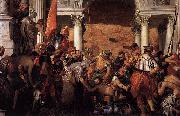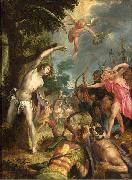Wholesale Oil Painting No Minimum |
|||||||||||
|
|
|||||||||||

|
|||||||||||
|
|
|
||||||||
Paolo VeroneseItalian Mannerist Painter, ca.1528-1588 Italian painter and draughtsman. With Titian and Tintoretto he makes up the triumvirate of great painters of the late Renaissance in Venice. He is known as a supreme colourist and for his illusionistic decorations in both fresco and oil. His large paintings of biblical feasts executed for the refectories of monasteries in Venice and Verona are especially celebrated. He also produced many altarpieces, history and mythological paintings and portraits. His compositional sketches in pen, ink and wash, figure studies in chalk, and chiaroscuro modelli and ricordi form a significant body of drawings. |
||||||||
|
|
||||||||
Martyrdom of Saint Sebastian
Martyrdom of Saint Sebastian Painting ID:: 86631 |
Date c. 1565(1565)
Medium Oil on canvas
Dimensions Height: 355 cm (139.8 in). Width: 540 cm (212.6 in).
cjr Date c. 1565(1565) Medium Oil on canvas Dimensions Height: 355 cm (139.8 in). Width: 540 cm (212.6 in). cjr |
|||||||
|
|
||||||||
Paolo Veronese1528-1588 Paolo Veronese Galleries Italian painter and draughtsman. With Titian and Tintoretto he makes up the triumvirate of great painters of the late Renaissance in Venice. He is known as a supreme colourist and for his illusionistic decorations in both fresco and oil. His large paintings of biblical feasts executed for the refectories of monasteries in Venice and Verona are especially celebrated. He also produced many altarpieces, history and mythological paintings and portraits. His compositional sketches in pen, ink and wash, figure studies in chalk, and chiaroscuro modelli and ricordi form a significant body of drawings. He headed a family workshop that remained active after his death. |
||||||||
|
|
||||||||
|
|
Martyrdom of Saint Sebastian
Martyrdom of Saint Sebastian Painting ID:: 87470 |
1565(1565)
Medium Oil on canvas
cyf 1565(1565) Medium Oil on canvas cyf |
||||||
|
|
||||||||
Paolo Veronese1528-1588 Paolo Veronese Galleries Italian painter and draughtsman. With Titian and Tintoretto he makes up the triumvirate of great painters of the late Renaissance in Venice. He is known as a supreme colourist and for his illusionistic decorations in both fresco and oil. His large paintings of biblical feasts executed for the refectories of monasteries in Venice and Verona are especially celebrated. He also produced many altarpieces, history and mythological paintings and portraits. His compositional sketches in pen, ink and wash, figure studies in chalk, and chiaroscuro modelli and ricordi form a significant body of drawings. He headed a family workshop that remained active after his death. |
||||||||
|
|
||||||||
|
|
Martyrdom of Saint Sebastian
Martyrdom of Saint Sebastian Painting ID:: 88352 |
1565(1565)
Medium Oil on canvas
cyf 1565(1565) Medium Oil on canvas cyf |
||||||
|
|
||||||||
Hans von Aachenwas a German mannerist painter. His name is derived from the birth place of his father, Aachen in Germany. Other variations of the name include Johann von - and - von Achen and various concisions like Janachen, Fanachen, Abak, Jean Dac, Aquano, van Aken etc. Hans von Aachen began painting in Germany as a pupil of the Flemish master E. Jerrigh. He then moved to Italy in 1574 to study further. He toured Rome and Florence, but eventually settled in Venice. He initially became a pupil of Kaspar Rems, but soon decided to develop his own mannerist technique, by studying Tintoretto and Michelangelo's followers. However, during all of his life he was influenced by the style of Bartholomeus Spranger and Hendrick Goltzius who dominated the art scene in Germany at the time. He returned to Germany in 1588 where he became well known as a painter of portraits for noble houses. He painted several works for Duke William V of Bavaria. He married Regina, the daughter of the composer Orlando di Lasso in Munich. In Munich he came into contact with the Imperial Court in Prague. In 1592 he was appointed official painter of Rudolph II, Holy Roman Emperor. However, Von Aachen only moved to Prague in 1601, where he stayed painting commissions from Emperor Rudolph II, and later from Matthias I. Amongst van Aachens pupils were Peter Isaak and Joseph Heinz. His works have been copied by Wolfgang Kilian, Dominicus Custos and Jan Sadeler. |
||||||||
|
|
||||||||
|
|
Martyrdom of Saint Sebastian
Martyrdom of Saint Sebastian Painting ID:: 97164 |
late 16th century
Medium oil on oak panel
Dimensions 65 X 58.5 cm (25.6 X 23 in)
cyf late 16th century Medium oil on oak panel Dimensions 65 X 58.5 cm (25.6 X 23 in) cyf |
||||||
|
|
||||||||
|
Hans von Aachen was a German mannerist painter. His name is derived from the birth place of his father, Aachen in Germany. Other variations of the name include Johann von - and - von Achen and various concisions like Janachen, Fanachen, Abak, Jean Dac, Aquano, van Aken etc. Hans von Aachen began painting in Germany as a pupil of the Flemish master E. Jerrigh. He then moved to Italy in 1574 to study further. He toured Rome and Florence, but eventually settled in Venice. He initially became a pupil of Kaspar Rems, but soon decided to develop his own mannerist technique, by studying Tintoretto and Michelangelo's followers. However, during all of his life he was influenced by the style of Bartholomeus Spranger and Hendrick Goltzius who dominated the art scene in Germany at the time. He returned to Germany in 1588 where he became well known as a painter of portraits for noble houses. He painted several works for Duke William V of Bavaria. He married Regina, the daughter of the composer Orlando di Lasso in Munich. In Munich he came into contact with the Imperial Court in Prague. In 1592 he was appointed official painter of Rudolph II, Holy Roman Emperor. However, Von Aachen only moved to Prague in 1601, where he stayed painting commissions from Emperor Rudolph II, and later from Matthias I. Amongst van Aachens pupils were Peter Isaak and Joseph Heinz. His works have been copied by Wolfgang Kilian, Dominicus Custos and Jan Sadeler. Martyrdom of Saint Sebastian late 16th century Medium oil on oak panel Dimensions 65 X 58.5 cm (25.6 X 23 in) cyf |
||||||||
|
|
||||||||
|
Prev Next
|
||||||||
|
|
||||||||
|
Related Paintings to Hans von Aachen :. |
||||||||
|
|
||||||||
|
CONTACT US |




